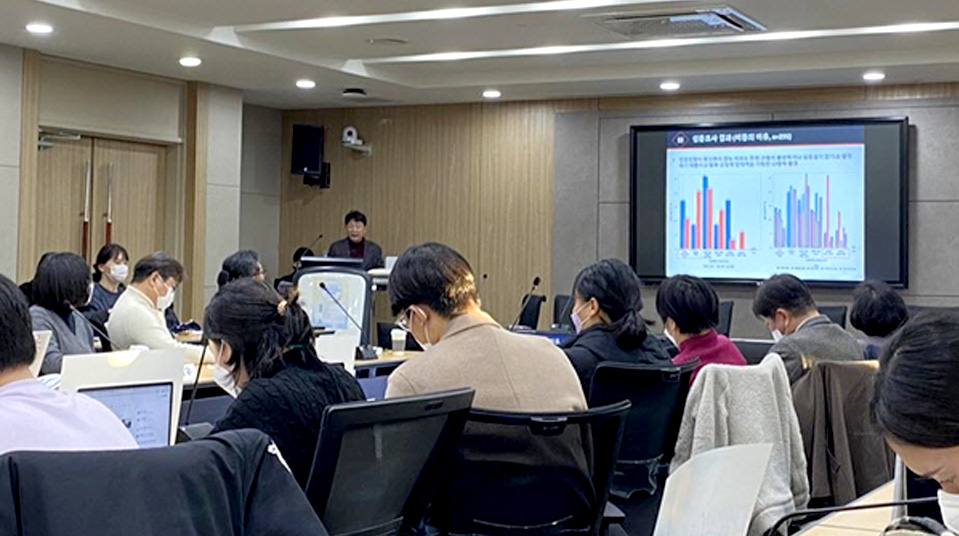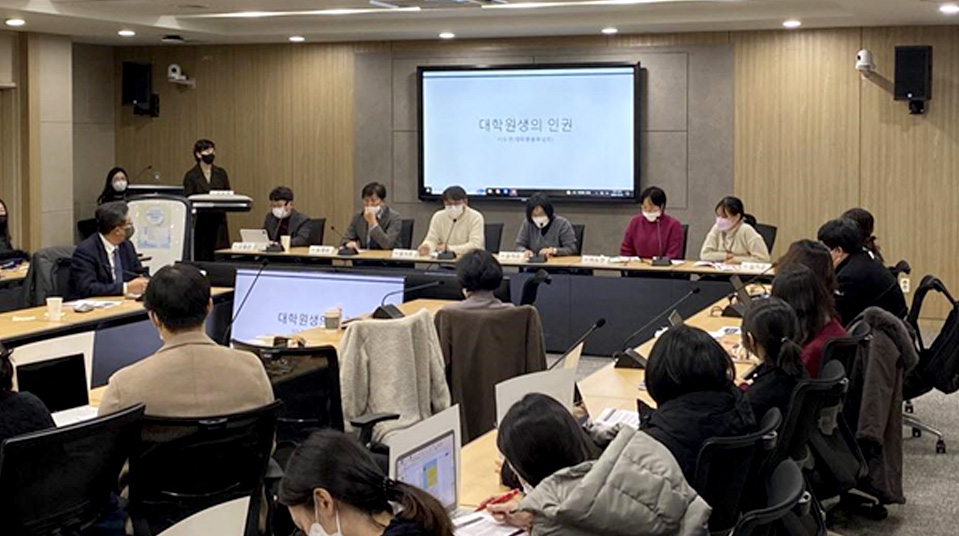On December 1, a policy forum about SNU’s human rights charter was held at the Graduate School of Public Administration (Building 57). The results of a perception survey investigating the future generation’s thoughts on the establishment of a charter were announced at the forum, followed by a debate regarding the findings. The SNU human rights charter was first suggested in January 2020 as part of a research project about the establishment of human rights norms at SNU. It was proposed in hopes of creating a university environment where members respect each other and have their human rights protected. A survey and discussion forum was conducted to collect the opinions of SNU members regarding the creation of such a charter. The conversion to an online environment in 2020 due to the pandemic, however, resulted in decreased opportunities for students to discuss human rights at SNU, ultimately hindering the establishment of the charter itself. The recent forum was hosted by the SNU diversity council in order to restart the discussion regarding human rights.

Professor Kilkon Ko reporting on the results of the perception survey about the future generation’s thoughts on SNU’s human rights charter
High Approval Rates regarding Anti-Discrimination and Equal Rights Clauses
The most important aspect in the discussion of the establishment of the university’s human rights charter was extracting a common perspective among the future generation. With Professor Kilkon Ko (Graduate School of Public Administration) at the forefront, a group of researchers surveyed undergraduate and graduate students from October 18 to November 3. Out of 33,573 students who were sent the survey, 5,363 responded, showing a 15.97% response rate, which is around 8 times higher than the response rate of the 2019 survey.
In the survey, students were presented with potential clauses of the SNU human rights charter and were asked to select whether they were in favor of or against them. All clauses showed an approval rate of over 95%, with the clauses on personal rights and anti-discrimination receiving the highest support. The clause on anti-discrimination and equal rights, which emphasizes the right to not be discriminated against based on traits including but not limited to gender and ethnicity, showed a 97.2% approval rate with only 80 respondents against the clause. The survey also included a question that measured students’ interests in a SNU human rights charter. 52.4% responded that they were very interested or held a little bit of interest. Although this showed a 27% increase in interest compared to the sample survey results of 2021, the interest of undergraduates is still low despite how 76.5% believed the human rights charter to be necessary. Meanwhile, 24.2% of respondents reported that they have experienced discrimination at the university, a figure lower than the 33.3% that was reported in 2021.

Members of the panel participating in debate
Reflection and Hope, “It is time to move forward”
In the following debate, various experts discussed the results of the survey and proposed further steps. “The fact that there are those that question the effectiveness of the human rights charter due to the low interest of students is a point that the Office of Student Affairs, which holds the responsibility of reflecting the needs of students, needs to reflect on,” said Kim Young-oh, Vice president of Student Affairs. Professor Kim Seok-ho (Department of Sociology) said that the survey results are an important resource that can help the human rights charter earn support. “The investigation was meaningful because it raised awareness of the concept of having the right to have rights,” said Professor Kim. Although Kim pointed out that the 2021 survey to be compared was a sample survey, but this survey is a full survey, he praised the researchers for their efforts to try and overcome these limitations. Professor Song Jiewuh (Department of Political Science and International Relations), who oversaw the investigation of the establishment of human rights norms in 2020, emphasized how despite high levels of agreement, student interest in the creation of a charter was low. She thus pointed out the importance of setting up an environment that would allow the clauses of the human rights charter to be laid out in the school regulations.
Through the investigation, the online student communities “Everytime,” and “SNULife” were highlighted as the main platforms where students experience discrimination. “It is difficult for the university to directly regulate actions on privately owned online platforms,” said Professor Song. She indicated that the best solution to resolving discrimination on these platforms is to indirectly attempt to regulate students’ actions and persuade the members of the SNU community to adhere to and act based on the human rights charter themselves. Graduate student body president Lee Do-Yeon stressed that the human rights charter needs to include a more diverse range of the SNU population, while former undergraduate student body president Kim Jieun stated that it is time to put the survey results into practical action.
Human rights at SNU are important because they allow members of the university community to participate equally in education, research, and duties. The university hopes that their efforts will help raise awareness of the importance of human rights among its members, helping them embrace the diverse range of talented people that will comprise the SNU community of the future.
Source https://www.snu.ac.kr/snunow/snu_story?md=v&bbsidx=139087
Written by Yeryoung Lee, SNU English Editor, yeryounglee@snu.ac.kr
Reviewed by Professor Travis Smith, Department of Asian Languages and Civilizations, tlsmith@snu.ac.kr

